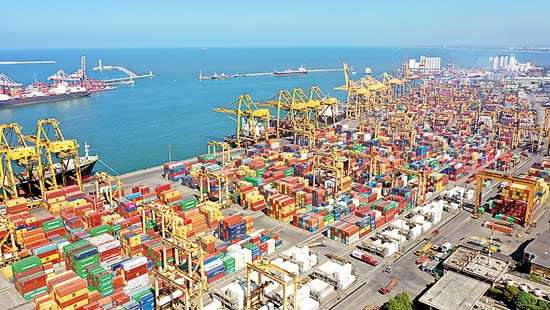Transshipment container volumes at the Port of Colombo fell for the second consecutive month in July by a record 7.5 percent year-on-year (YoY) to 460,736 TEUs as main shipping lines temporarily opted for alternative routes at the height of the country’s political and social unrest.
Although, the operations at Port of Colombo remained largely intact despite the mass protests and political crisis, a local shipping agent pointed out that July 9th further escalated concerns on law and order in Sri Lanka among the main shipping lines.
Industry stakeholders fear it might take several months to regain confidence of main shipping lines.
In the seven-month period, transshipment container volumes declined by 0.2 percent YoY to 3.35 million TEUs.
Overall, container throughput at the Port of Colombo declined by 10.5 percent YoY to 553,890 TEUs in July.
In particular, import (laden) container volumes declined by a steep 21.4 percent YoY to 30,366 TEUs while export (laden) container volumes dipped by 6.8 percent YoY to 25,247 TEUs.
The SLPA-managed Jaya Container Terminal (JCT) and its partially operational East Container Terminal (ECT) handled only 115,539 TEUs in July, recording a sharp YoY decline of 39 percent, due to the notable decline in transshipment container volumes from India.
However, the port’s only fully operational deep container terminal, Colombo International Container Terminal (CICT) managed to handle 286,419 TEUs in the month, up by 1.2 percent YoY.
Similarly, the container volumes handled by South Asia Gateway Terminal (SAGT) also rose by 3.5 percent YoY to 151,932 TEUs in the month.
Overall, the container throughput of Port of Colombo declined by 2.1 percent YoY to 4.11 million TEUs in the seven-month period. Meanwhile, cargo handled by Hambatota Port also declined by 48.6 percent YoY to 147,495 TEUs in July.
The Management of Sri Lanka Ports Authority (SLPA), the terminals Colombo International Container Terminals Ltd (CICT), South Asia Gateway Terminals (Pvt) Ltd (SAGT) together with CASA (Ceylon Association of Shipping Agents) assure global Shipping Lines and Operators of Container and Conventional services of operations being carried out uninterrupted and at normal and expected levels in the Port of Colombo despite the economic and political crisis situation in the Country.
Continued and unhindered operations at the Port are also receiving attention at the highest level of the Government of Sri Lanka consequent to the appointment of a new Prime Minister last week.
The Port of Colombo (POC), being identified as an essential service, catering to vital transshipment, exports, imports and related logistics services which are the backbone of the economy of Sri Lanka, has received and is assured of an uninterrupted supply of electricity and fuel to maintain the demand required.
Shipping services are essential service exports and contribute immensely to the Sri Lankan economy and hence the shipping community stresses the importance of Colombo as a regional transshipment hub.
Inter-terminal trucking between terminals and transport for logistics services to move domestic laden and empty containers are receiving priority and connections for transshipment containers are able to make their targets on carriers without misses. Clearance of imports and export shipments are moving at desired levels notwithstanding delays in the clearance of some import cargoes due to a shortage of foreign currency.
The Port trade unions acknowledge the vital importance of the sector for economic sustenance and revival of the Country and the Management of SLPA and the private terminals, CICT and SAGT are confident that they would be in a position to meet the economic challenges and ensure service delivery to customers.
